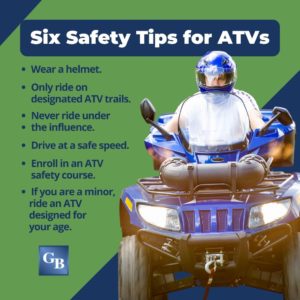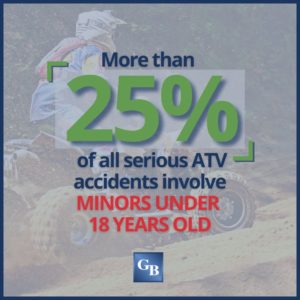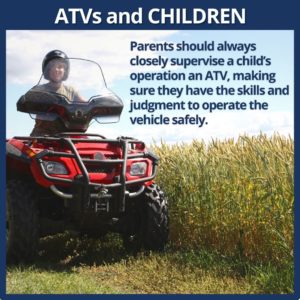Philadelphia ATV Accident Lawyers
All-Terrain Vehicle Accidents
All-terrain vehicles (ATVs) are optimized for driving off road on various types of unpaved trails. Their design is different from cars, with three or four low-pressure or nonpneumatic tires, handlebars for steering, and a straddle-type seat.
ATV riders control braking and acceleration by using a thumb throttle or twist throttle. People operate ATVs primarily for recreation, although some are designed for work use.
Riding an ATV can be fun, but it is also dangerous. Each year, thousands of ATV riders in the United States seek medical treatment for severe injuries from ATV accidents. Hundreds of individuals, including many children, die every year riding ATVs. If you are injured in an ATV accident, contact an ATV accident lawyer to protect your rights.
Are ATVs More Dangerous to Operate Than Off-Road Motorcycles or Cars?
Research suggests that ATVs are more dangerous to operate than off-road motorcycles or cars. According to one study by Johns Hopkins Medicine, accidents involving four-wheel ATVs inflict far more severe injuries than accidents involving two-wheel, off-road motorcycles.
The study found that people injured in ATV accidents versus motorcycle accidents were 55 percent more likely to be admitted to an intensive care unit (ICU) and 50 percent more likely to suffer fatal injuries.
Evidence suggests that ATVs are also more dangerous to operate than cars. Unlike cars, ATVs are open, and occupants can be quickly ejected if a vehicle tips over. Many serious injuries happen when an ATV rolls over on an operator. Other reasons why ATVs can be more dangerous to operate than cars include but are not limited to the following:

- Throttle-based controls: A throttle instead of foot pedals typically controls ATV braking and acceleration. It can be quite tricky for a driver to control an ATV with a twist throttle. If the operator leans forward and twists the throttle by mistake while driving downhill, the ATV may accelerate too quickly and throw them forward into the vehicle’s path.
- Lack of safety features: Many ATVs lack seat belts, roll bars, and other devices that could protect an operator in the event of a vehicle rollover.
- Operation in remote areas: ATVs are often used where it is difficult, if not impossible, to get a car or ambulance quickly to the injured person for transport to a hospital.
Each year, hospital emergency rooms treat approximately 100,000 injuries caused by ATV accidents. However, because many people do not report ATV accidents, the injury rate is likely much higher. This injury rate may climb as the ATV market is projected to grow about five percent each year.
Ride ATVs only on designated trails, and always wear a helmet!
What Injuries Are Common in ATV Accidents?
The most common injures in ATV accidents include the following:
- Concussions and other traumatic brain injuries: Head injuries often occur when an ATV rolls over on an occupant or when the occupant hits their head after being ejected from the vehicle.
- Spinal cord injuries: Riders thrown from an ATV may also seriously injure their back or neck.
- Fractures and broken bones: About one-third of all of those injured in ATV accidents treated in hospital emergency rooms suffer some type of bone damage.
- Lacerations, cuts, and bruises: These types of injuries occur in more than 10 percent of all ATV accident cases.
- Internal organ damage: Nearly 10 percent of those injured in ATV accidents suffer internal organ damage.
Sprains, strains, and dislocated knees, elbows, or shoulders are also common in ATV accidents. Unfortunately, many riders die each year due to their injuries. More than one-third of all those injured in ATV accidents are children or teenagers.
How Can ATV Riders Minimize the Risk of Injury?
 There are many ways ATV riders can minimize the risk of injury, according to the U.S. Consumer Product Safety Commission (CPSC):
There are many ways ATV riders can minimize the risk of injury, according to the U.S. Consumer Product Safety Commission (CPSC):
- Always wear a helmet, eye protection, boots, and gloves.
- Do not drive ATVs on paved roads.
- Do not allow passengers to ride in ATVs designed for a single operator.
- Do not allow minors to drive or ride ATVs designed for adults.
- Take an ATV safety course.
Wearing a helmet can help minimize the risk of serious traumatic brain injury. According to the Insurance Institute for Highway Safety (IIHS), in at least 80 percent of fatal ATV accidents, the injured party was not wearing a helmet.
Another good way to minimize the risk of injury is to learn and understand the different types of ATVs available.
Six ATV Safety Tips
- Wear a helmet.
- Ride only on designated ATV trails.
- Never ride under the influence.
- Drive at a safe speed.
- Enroll in an ATV safety course.
- If you are a minor, ride an ATV designed for your age.
What Types of ATVs Are Available?
There are two basic types of ATVs available on the market today:
- Type I ATVs: These vehicles are designed for one operator and no passengers.
- Type II ATVs: These vehicles accommodate a driver and one passenger that sits behind the operator.
ATV users must recognize that ATVs are not one-size-fits-all, even within each type. Manufacturers produce different sizes of ATVs, and each vehicle includes a warning label specifying the minimum age recommendation. In states where it is legal for minors to ride ATVs, look for youth models that generally operate at slower speeds and better accommodate smaller hands and feet.
How Is a Utility Terrain Vehicle Different From an ATV?
A utility terrain vehicle (UTV) is different from an ATV. It has features designed more for work than recreation and is more like a car. It has a steering wheel and can typically accommodate two to four passengers. UTV operators control braking and acceleration by using foot pedals. UTVs are also more likely to be equipped with seat belts or other safety equipment. They may also include a windshield or an open or enclosed cabin.
UTVs typically include storage space to haul equipment on farms or other locations where maneuvering a truck may be impossible.
Where Is ATV Riding Permitted in Pennsylvania?
ATV riders must always know if the trails they plan to use are open for ATV use. The Pennsylvania Department of Conservation and Natural Resources (DCNR) establishes and enforces rules for riding ATVs statewide.
According to the DCNR, riding an ATV is permitted in Pennsylvania in the following locations:
- Trails on state-owned property that are clearly marked and designated for ATV use.
- On state and local highways and roads designated and posted for ATVs by the authority with jurisdiction over them.
- On highways and streets when necessary to cross a bridge or culvert or during periods of emergency.
- On highways and streets during special events conducted according to a prearranged schedule under government permit.
- On streets and highways designated as ATV or snowmobile roads by the appropriate government agency.
- On private property with the consent of the owner.
However, municipal ordinances may further regulate the use of ATVs on roads or private properties within their jurisdiction. Also, state forest roads and state game lands are not open to ATV riding unless there is a designated trail.
Can Riders Face Fines in Pennsylvania?
ATV riders may face citations and fines in Pennsylvania if they do the following:
- Drive on trails or roads not designated for ATV use.
- Operate vehicles at high or unsafe speeds.
- Drive recklessly or under the influence of drugs or alcohol.
- Disturb or pursue wildlife while in an ATV.
- Operate an ATV without wearing a securely fastened helmet.
Fines for first offenses range from $50 to $200 plus prosecution costs. A second offense carries a penalty of $100 to $300 plus prosecution costs. ATV owners who do not register their vehicles or obtain liability insurance are subject to an automatic $300 fine, plus prosecution costs.
Can Minors Operate ATVs?
Some minors are allowed to operate ATVs; however, laws vary from state to state. In Pennsylvania, children cannot operate ATVs anywhere other than private property owned or leased by a parent or guardian. They must have a valid safety certificate or be under the direct supervision of a certified instructor. Children must be at least 8 years old to obtain a valid safety certificate in Pennsylvania.
Parents considering an ATV safety certificate for their children should also evaluate the many risks involved in ATV operation. More than 25 percent of all serious ATV accidents involve children and teenagers under 18 years old.
What Should Parents Do Before Allowing Their Children to Use ATVs?
According to the ATV Safety Institute, parents should do the following before allowing their children to use an ATV:
- Evaluate the child’s visual perception.
- Evaluate the child’s motor development.
- Make sure the child understands and will obey safety rules.
- Enroll the child in a safety course.
- Purchase an ATV that suits the child’s size and weight.
Children must be able to see well enough to operate an ATV. Their peripheral vision must be excellent to see what is happening on both sides of the ATV while they are driving. The ability to judge distance is also crucial to the safe operation of an ATV.
Children should have enough strength and coordination in their fingers, hands, and arms to operate the handlebars for steering as well as the throttle for braking and acceleration.
Emotional development is as critical as physical strength. Children who do not like to obey rules or are reckless on a bike or skateboard should not operate an ATV. Signs of ATV readiness include consistently looking both ways before crossing a street, safe and skilled bike riding, and openness to wearing a helmet. Children, who lack coordination, balance, and reasoning skills should not operate an ATV.
Parents should always closely supervise a child on an ATV, ensuring they have the skills and judgment to operate the vehicle safely.
What Are Some Common Causes of ATV Accidents?
ATV accidents happen for many reasons like car accidents or truck accidents. However, unlike other auto accidents, many ATV accidents occur when the owner permits someone to use an ATV when that person should not. It could be a child, an inexperienced rider, or a person under the influence of drugs or alcohol.
Common causes of ATV accidents include but are not limited to the following:
- Youth or inexperience: Operators who are not adequately trained or too young to handle the controls account for a significant portion of ATV accidents.
- Speeding: Going too fast over uneven ground is a common cause of vehicles flipping over.
- Intoxication: ATV riding is an essentially recreational experience. Unfortunately, many ATV operators use drugs or alcohol before riding, impairing their vehicle handling.
- Driving on paved roads: ATVs handle poorly on paved roads.
- Carrying passengers: Most ATVs are designed for one operator. Riding double creates an additional risk of tipping over.
- Aging or defective equipment: According to the CPSC, the average life of an ATV is seven years. Faulty or poorly maintained vehicles may be a significant contributing factor to a serious ATV accident.
The underlying cause of an ATV accident may not be immediately apparent. That is why anyone involved in an ATV accident should contact a lawyer who can initiate an investigation to determine the accident’s cause and who is liable.
What Should I Do if I am Injured in an ATV Accident?
If you are injured in an ATV accident, seek medical treatment as soon as possible, even if you think your injuries are minor. Some injuries, such as sprains or back pain, do not become evident until days later. Also, any delay in seeking medical care may give an insurer reason to deny paying an insurance claim.
You should also contact a lawyer if you are injured in an ATV accident, no matter whom you believe was at fault. The ATV manufacturer or dealer who sold you the vehicle could be liable for the accident if parts are defective.
In addition, if your accident was on the private property of an owner responsible for maintaining the ATV trail for public access, the owner could be held liable for injuries caused by a steep drop-off, potholes, or another unmarked hazard.
If the ATV accident involved children, a premises owner who allowed the child to ride the ATV can be held liable.
How Has Galfand Berger LLP Helped Those Injured in ATV Accidents?
Our Philadelphia ATV accident lawyers at Galfand Berger LLP have years of experience representing those injured in ATV-related accidents and their families. Galfand Berger LLP has obtained millions of dollars in settlements, including the following:
- $6 million-dollar recovery for a 9-year-old boy blinded in an ATV accident. The ATV owner, which was a hunting preserve company, allowed a 9-year-old minor to ride an ATV vehicle that he knew was designed only for persons 16 years old and older. While the child was operating the vehicle, the owner’s hunting dogs got loose and startled the minor causing him to flip and overturn the ATV resulting in the handlebar striking his eye socket and damaging his optic nerve causing him to become blind. The case was handled by Galfand Berger Senior Partner Richard M Jurewicz, Esquire
- $301,000 recovery in an ATV rollover accident. In another incident of an ATV owner allowing a minor to use a vehicle designed for older ages, the ATV rolled over onto the child and caused severe injuries.
Although each case is different and recovery of damages always depends on the circumstances of the accident, our legal team works tirelessly to preserve our clients’ rights.
Philadelphia ATV Accident Lawyers at Galfand Berger LLP Assist Individuals Injured in ATV Accidents
Riding an ATV can be fun, but there are dangers involved. If you have been injured in an ATV accident, reach out to our Philadelphia ATV accident lawyers at Galfand Berger LLP today. Our experienced legal team will protect your rights. Call us at 800-222-USWA (8792) or contact us online to schedule a free consultation. From our offices in Philadelphia, Bethlehem, Lancaster, and Reading, Pennsylvania, we proudly serve clients throughout Pennsylvania and New Jersey, including Allentown and Harrisburg.
 Google Screened
Google Screened
